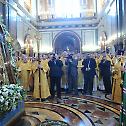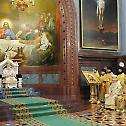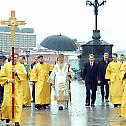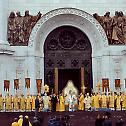Primate of Russian Church leads celebrations in Moscow on occasion of 200th anniversary of Russia’s victory in Patriotic War of 1812
On 9 September 2012, the 14th week after Pentecost, His Holiness Patriarch Kirill of Moscow and All Russia led the celebrations in Moscow, marking the 200th anniversary of Russia’s victory in the Patriotic War of 1812.
The Primate of the Russian Church celebrated the Divine Liturgy at the Cathedral of Christ the Saviour which is a memorial to the heroes of the War of 1812.
On Saturday evening the wonderworking Smolensk Icon of the Mother of God was brought into the Cathedral of Christ the Saviour. It was this icon that General Kutuzov’s army prayed at on the eve of the battle of Borodino. The Icon will not leave the Cathedral of Christ the Saviour until the 14th of September.
Concelebrating with His Holiness Patriarch Kirill were Metropolitan Juvenaly of Krutitsy and Kolomna; Metropolitan Varsonofy of Saransk and Mordovia, chancellor of the Moscow Patriarchate; Metropolitan Hilarion of Volokolamsk, chairman of the Moscow Patriarchate’s Department for External Church Relations; Metropolitan Ioann of Belgorod and Stary Oskol, chairman of the Synodal Missionary Department; Metropolitan Kirill of Stavropol and Nevinnomyssk, chairman of the Synodal Committee for Cooperation with the Cossacks; Archbishop Arseny of Istra; Archbishop Yevgeny of Vereya, chairman of the Synodal Education Committee; Archbishop Feognost of Sergiev Posad, chairman of the Synodal Department for Monasteries and Monasticism; Archbishop Mark of Yegoryevsk, head of the Moscow Patriarchate’s office for institutions abroad; Bishop Ilian (Vostryakov); Bishop Nikon (Mironov); Schema-Bishop Sergy (Zaliznitsky); Bishop Tikhon of Vidnoye; Bishop Feofilakt of Dmitrov; Bishop Innokenty of Bronnitsy, chairman of the Synodal Department for Youth Affairs; Bishop Sergy of Solnechnogorsk, head of the Administrative secretariat of the Moscow Patriarchate; Bishop Ieronim (Chernyshov); Bishop Tikhon of Podolsk, chairman of the Moscow Patriarchate’s financial and economic office; Bishop Panteleimon of Smolensk and Vyazma, chairman of the Synodal Department for Charity and Church Service; Bishop Nikolai of Balashikha; Bishop Savva of Voskresensk; Bishop Konstantin of Zaraisk; archpriest Vladimir Divakov, Patriarch’s secretary for Moscow; Archpriest Dimitry Smirnov, chairman of the Synodal Department for Cooperation with the Armed Forces and Law Enforcement; Archpriest Vsevolod Chaplin, chairman of the Synodal Department for Church-Society Relations; archimandrite Savva (Tutunov), deputy chancellor of the Moscow Patriarchate; archimandrite Feoktist (Dimitrov), representative of the Patriarch of Bulgaria to the Patriarch of Moscow and All Russia; archpriest Mikhail Ryazantsev, a sacristan of the Cathedral of Christ the Saviour; archpriest Alexy Yuschenko, representative of the Orthodox Church of the Czech Lands and Slovakia to the Patriarch of Moscow and All Russia; abbots of stavropegic monasteries; and deans and clergymen of the Moscow and Smolensk dioceses.
Present at the Divine Service were Sergei Naryshkin, chairman of the State Duma of the Federal Assembly of the Russian Federation; Vladimir Legoida, chairman of the Synodal Information Department; rectors and clerics of Moscow churches; and numerous worshippers.
Singing at the Liturgy were the Moscow Synodal Choir, Choir of the Sretensky Stavropegic Monastery, and the Choir of the Cathedral of Christ the Saviour.
The Divine Service was broadcast on the screens installed in the square in front of the Cathedral of Christ the Saviour.
After the reading from the Gospel, Metropolitan Ioann of Belgorod read out the Message of His Holiness Patriarch Kirill on the occasion of the 200th anniversary of Russia’s victory in the Patriotic War of 1812.
His Holiness Patriarch Kirill ordained a cleric of the Cathedral of Christ the Saviour, protodeacon Alexander Ageikin, a priest. After that Father Alexander was elevated to the rank of archpriest.
Metropolitan Hilarion of Volokolamsk read out the Joint Message to the Peoples of Russia and Poland, signed by the Primate of the Russian Orthodox Church, His Holiness Patriarch Kirill of Moscow and All Russia, and the President of the Polish Bishops’ Conference, Archbishop Józef Michalik, Metropolitan of Przemyśl.
After the Liturgy, His Holiness Patriarch Kirill led the procession of the cross around the Cathedral of Christ the Saviour. The wonderworking Smolensk Icon of the Mother of God was taken out onto the steps of the northern entrance to the Cathedral. The Primate of the Russian Church said a thanksgiving prayer at the Icon in commemoration of Russia’s victory in the Patriotic War of 1812.
Singing at the service was the Moscow massed choir conducted by Alexei Puzakov, an honoured artist of Russia.
After the thanksgiving prayer, the Primate of the Russian Church addressed the worshippers with a primatial homily and read out a patriarchal decree stating that in commemoration of the 200th anniversary of Russia’s victory in the Patriotic War of 1812, the Divine Liturgy at the Cathedral of Christ the Saviour may be celebrated with the Royal Doors open until the Lord’s prayer.
As the Main Directorate of Internal Affairs reports, there were about five thousand people at the Cathedral of Christ the Saviour that day, another ten thousand people gathered in the square in front of the northern gates of the Cathedral. Present at the prayer service were clergymen of the Moscow diocese, staff-members of the Moscow Patriarchate and the Synodal institutions, workers of the Sofrino art production enterprise of the Russian Orthodox Church, students of the theological schools of the Moscow region, sisters of charity, members of the Orthodox youth organizations, representatives of the Cossack army, and parishioners of Moscow churches.
Source: mospat.ru










